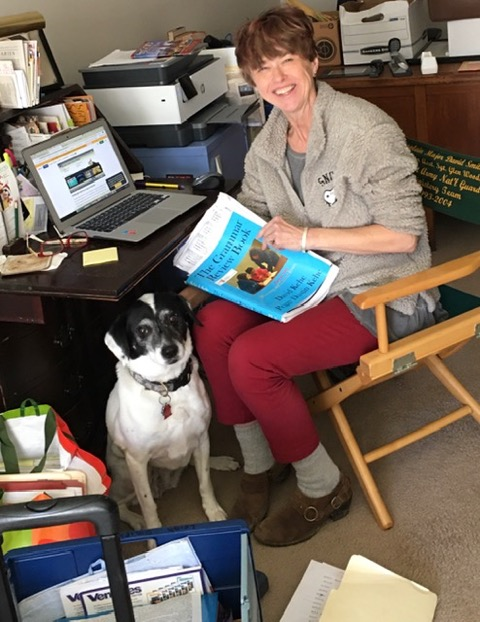
Submitted by Leigh Smith, ESOL Teacher at VT Adult Learning’s St. Albans Office
Imagine coming to a country and culture where you didn’t know anyone and, suddenly, everyone you wanted to speak with disappeared inside. Suddenly, you’re responsible for overseeing your kids’ online schoolwork during a global pandemic. You also had to learn the local protocol for physical distancing and whether to wear a mask or not.
Imagine what that would be like if you did not know the language to navigate these skills. Imagine what fear or pain is like, with no language facility to express your feelings during a telemedicine appointment. Perhaps you do not know what “telemedicine” is or that it even exists as an option.
Thanks to free, online English Language classes through Vermont Adult Learning, non-native English speakers can gain a face, a friend, and the words to build on what they want and need to know in a new town and a new era.
Leigh Smith teaches English to Speakers of Other Languages (TESOL) at Vermont Adult Learning of Franklin and Grand Isle Counties.
“Even before COVID-19, I had a gut feeling we would need to offer online offerings, sooner rather than later,” she said Tuesday after nearly three weeks of lock-down. “And we really had a very short time to transition. Some of us took to it like a fish to water — many of my language students live on their phones and Apps are nearly their first language. But I call myself ‘The Dinosaur,’” she laughed. “My boss coached me quickly on Google Hangouts, and I’ve been meeting my students there ever since mid-March.”
Smith credited her TESOL colleagues at Vermont Adult Learning for coming together quickly to share resources and techniques for managing, and even extending, their student caseload. Those colleagues have also conferenced online with other agencies, including USCRI Vermont (formerly Vermont Refugee Resettlement Program), Mercy Connections, and Vermont Migrant Education Program at the University of Vermont.
“I’ve learned a new word — ‘Zoom-Bombing,’” Smith said. “We’ve discovered what platforms may be safe, and which ones might not be, to encourage our students to share. I’ve been blessed with very supportive management staff who have encouraged me to explore webinars about teaching English effectively online, and to remind me to take it easy when I am impatient with myself.”
Online options are not the only ways that English instructors are reaching out to adult immigrants or migrant workers. Some teachers call students directly, or send them hard copies of assignments in the mail.
“No matter what,” Smith offered, “our mission is clear: to reach out however we can, and make sure none of our charges falls through the cracks if we can help it.”
Smith’s work environment moved from being a cozy, sunlit office and multiple classrooms to an old secretary desk in a cramped basement.
“My dog keeps me company,” Smith said, “even if it’s allowed for a few breaks in conversation we didn’t expect.”
How soon students return to their English classrooms is unknown. What is certain is that the challenges and opportunities of learning a new language in difficult times will continue.
“They’re up to it,” Smith said of her learners. “Some have survived horrific circumstances I couldn’t describe here, and some are even now undergoing the heartbreak of having their businesses cut off or being isolated from their children. Nevertheless, they give me courage. When I think of giving up, I can look at just one of them and become stronger.”

